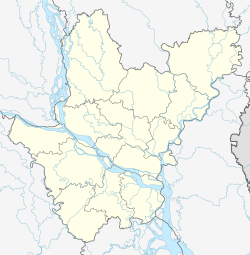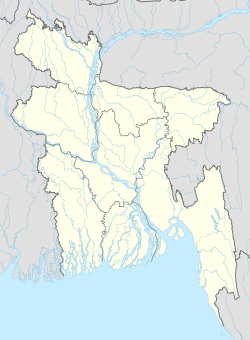BSCIC Jamdani Industrial Estate & Research Center is a weaving village in Narayanganj District of Bangladesh. It is popularly known as "Jamdani Palli", as it is used as an industrial estate for weaving Jamdani clothing.[1]
BSCIC Jamdani Village
বিসিক জামদানি পল্লী BSCIC Town | |
|---|---|
| Coordinates: 23°43′42″N 90°30′53″E / 23.728398°N 90.514594°E | |
| Country | Bangladesh |
| Division | Dhaka |
| District | Narayanganj |
| Upazilla | Rupganj |
| Languages | |
| • National | Bengali |
| Time zone | UTC+6:00 (BST) |
| PIN code | 1463 |
Location edit
The village, situated in Noapara, Tarabo, Narayanganj District, is located 3 km (1.9 mi) north from the bridge of Kanchpur, the capital of Bangladesh,[1] and 30 km (19 mi) from Dhaka.[2] One needs to use N2 highway to access the village.[1]
History edit
The village was established on 20 acre land by Bangladesh Small and Cottage Industries Corporation as "BSCIC Jamdani Industrial Estate & Research Center" at a cost of ৳6 crore in 1991.[1] In 2020 and 2021, the weavers of the village faced financial losses due to the inability to sell Jamdani due to the COVID-19 epidemic. In 2022, Jamdani village started selling clothes again.[3] In 2021, the government decided to establish a museum, an exhibition and sales center and a fashion design institute in the Jamdani Village.[4]
Industry and market edit
416 plots were developed in the industrial park out of which 407 plots are currently allotted to weavers. The weavers working in the allotted plots live in this village and numbered 1,600 as of 2023. Here weavers make ready-made garments from jamdani without the help of machinery. Every Friday there is a temporary market in this Jamdani Village where clothes can be bought at wholesale prices.[1] There are total 480 handlooms in this village.[5]
Issue edit
Most of the approach roads to Jamdani Village are in poor condition. Although this situation prevailed for a long time, the concerned authorities did not take any measures to solve the issue.[6] It is alleged that weavers working in village looms are paid less than their due wages.[3] Besides, some unscrupulous groups have set up commercial establishments in exchange of looms by allotting plots in this village in exchange of bribes. Besides, the income of the looms has decreased as a result of fake jamdani sarees imported from India.[7]
Gallery edit
-
A access road of the village
-
A jamdani shop in the village
-
Dyeing process
-
Jamdani weaving in a loom of the village
-
A loom in the village
References edit
- ^ a b c d e Ahmed, Farhana (22 February 2023). "Jamdani Palli: A village that weaves tradition". The Daily Star. Archived from the original on 20 March 2023. Retrieved 19 April 2023.
- ^ "দেশের একমাত্র জামদানি পল্লী নারায়ণগঞ্জে". Boishakhi Television (in Bengali). 8 October 2018. Archived from the original on 19 April 2023. Retrieved 19 April 2023.
- ^ a b Ali Saikat, Shawkat (16 April 2022). "জামদানি পল্লী: কোটি টাকার বিক্রি, তবুও কমেছে মজুরি". Somoy TV (in Bengali). Archived from the original on 16 April 2022. Retrieved 19 April 2023.
- ^ Haque, Mezbahul (10 April 2023). "জামদানি উৎপাদন ও বাজারজাতে নতুন প্রকল্প". Bonikbarta.net (in Bengali). Archived from the original on 19 April 2023. Retrieved 19 April 2023.
- ^ Hossain Siam, Sourav (13 April 2023). "ব্যস্ত জামদানি পল্লী, তবে 'বিক্রি কম'". Bdnews24.com (in Bengali). Archived from the original on 13 April 2023. Retrieved 19 April 2023.
- ^ "Almost all the roads at BSCIC Jamdani Palli at Noapara under Tarabo municipality at Rupganj in Narayanganj have remained in a bad shape for a long time, causing sufferings for the residents. But the authorities concerned seem to have turned a blind eye to the problem. The photos were taken on Monday. – SUN PHOTO". Daily Sun. 15 March 2023. Archived from the original on 19 April 2023. Retrieved 19 April 2023.
- ^ Ahmed, Rasel (18 April 2015). "রূপগঞ্জের রূপসী জামদানি". Kaler Kantho (in Bengali). Archived from the original on 25 May 2015. Retrieved 19 April 2023.

